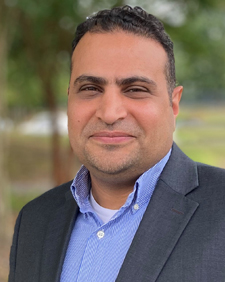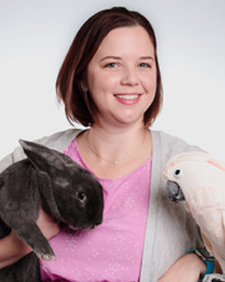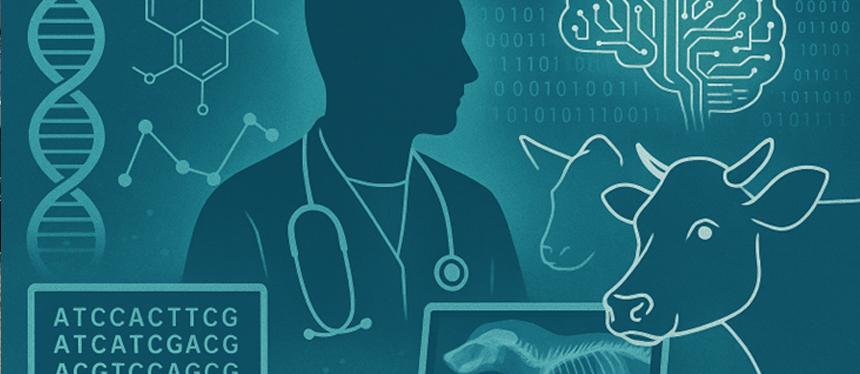AI and Bioinformatics Cluster
AI and Bioinformatics Cluster
Smarter Research Through Data, AI and Bioinformatics
Cluster Overview
The AI and Bioinformatics Cluster brings together researchers leveraging advanced computational tools to solve complex problems in biology and medicine. Our work spans data analytics, molecular bioinformatics, drug discovery, and disease modeling, with a focus on generating actionable insights from large and diverse datasets. By integrating artificial intelligence with biological research, we aim to improve diagnostics, accelerate therapeutic development, and advance understanding of health and disease across species. This cluster serves as a hub for innovation at the intersection of data, biology, and technology, fostering collaboration and cutting-edge research.
Core Research Themes
- Molecular & Systems Bioinformatics: Integrating genomics, transcriptomics, metabolomics, and microbiome data for deeper biological insights.
- AI-Driven Diagnostics: Machine learning application for pathogen detection, imaging analysis, and precision diagnostics.
- Predictive Disease Modeling: Risk forecasting, treatment response prediction, and climate-health modeling across species.
- Digital Therapeutics & Drug Discovery: AI tools for screening compounds, veterinary pharmacy optimization, and drug repurposing strategies.
- Data accuracy, reliability, and interoperability: Ensuring credibility, reusability, and seamless integration of complex datasets.
Meet the Team

Cluster lead
Mohamed A. Abouelkhair, DVM, MS, PhD, DACVM, CABMM
Dr. Abouelkhair leads innovative AI-assisted metagenomic approaches for pathogen identification and molecular characterization in veterinary medicine. His research also harnesses microbial biology and immune regulation to develop novel immunotherapies for aggressive companion animal cancers, using advanced machine learning frameworks.
Expertise: Virology, Clinical Immunology, Molecular Biology, Metagenomics, Machine Learning
[Publications] | [Contact]

Pratap Kafle, DVM, PhD, DACVM
Dr. Kafle studies the impacts of global change on host-parasite interactions, from local to global scales. His research integrates traditional methods with genomics, AI, and data analytics for parasite detection, ecological modeling, and improved surveillance within a One Health framework.
Expertise: Host-parasite interactions, Wildlife parasitology, Diagnostics, Ecological modeling
[Publications] | [Contact]

Bahareh Ahmadi, DVM, MSc, PhD
Dr. Ahmadi develops machine learning solutions for tissue image analysis, histopathology, and digital pathology, integrating imaging and molecular data to improve disease characterization and diagnostic accuracy.
Expertise: Digital Pathology, Computational Imaging, AI in Biomedicine
[Publications] | [Contact]

Nora Jean Nealon, DVM, PhD
Dr. Nealon integrates bioinformatics datasets (metabolomics, 16S sequencing, whole genome sequencing, shotgun metagenomics) with clinical metadata to understand the relationships between animal/human hosts and the gut microbiota. Her research focuses on antimicrobial resistance and gastrointestinal disease in domestic animals, with translational relevance to humans. She also uses bioinformatics to develop and screen bioactive products derived from beneficial microorganisms.
Expertise: Microbial Bioinformatics, Bacteriology, Gastroenterology, Probiotics, Antimicrobial Resistance
[Publications] | [Contact]

Pam Lough, MLS, PhD
Dr. Lough specializes in interoperability of data from different sources. Her research has facilitated automated reporting on healthcare quality indicators. She works to improve consistency and availability of metadata, which AI uses to generate content, and emphasizes the importance of high quality metadata for successful predictive analytics. She has collaborated with Kent County Council’s (UK) Department of Public Health to improve interoperability of administrative data used to predict public health needs.
Expertise: Data management, Interoperability, Public Health
[Publications] | [Contact]

Andrea Winkel, DVM, MPH
Dr. Winkel brings over 15 years of experience in exotic animal medicine. She holds a Master of Public Health complementing her time as a military veterinarian, where she focused on zoonotic disease surveillance and One Health initiatives. Her clinical and academic work is enriched by a growing interest in AI applications in veterinary medicine, including diagnostic support and workflow optimization tools tested across multiple practices.
Expertise: Zoo and Exotic Animal Medicine, Public Health: Zoonotic Diseases, One Health, AI in Veterinary Medicine
[Publications] | [Contact]
Trainees and Collaborators
Viet Linh, DVM, PhD (Postdoctoral fellow, Kafle Lab)
Ola Elsakhawy, MD, PhD (Postdoctoral fellow, Abouelkhair Lab)
Student researchers
Ahmed Aldesoky (Abouelkhair Lab)
Featured Research Projects
AI-Driven Screening of Anticancer Molecules
Leads: Dr. Abouelkhair, Dr. Nealon, and Dr. Kafle
Combining AI, molecular bioinformatics, and machine learning to identify novel anticancer molecules derived from microbes and parasites.
Comparative Genomics of Pathogens in Domestic and Wild Animals
Lead: Dr. Abouelkhair
Applying Innovative AI-assisted shotgun metagenomic for pathogen identification and molecular characterization.
Distributional Ecology of Parasites and Their Vectors
Lead: Dr. Kafle
Predicting parasite distribution and ecological dynamics using AI and machine learning, integrating field and analytical data to improve control strategies.
Antimicrobial Resistance in Probiotics
Lead: Dr. Nealon
Investigating phenotypic and genotypic antimicrobial resistance in probiotics with implications for safety, supplement development, and One Health.
Fecal Origins of Uropathogens in Canine Recurrent UTIs
Lead: Dr. Nealon
Exploring the “gut-bladder” axis in dogs using whole genome sequencing, shotgun metagenomic approach, and clinical metadata to study the impact of antimicrobial therapy on fecal shedding of resistant uropathogens.
Facilities and Resources
Our cluster leverages cutting-edge AI pipelines, bioinformatics infrastructure, and computational tools to support data-driven research in veterinary medicine, parasitology, microbiomics, and molecular diagnostics.Current Opportunities
Summer Research Experience: Open to veterinary, graduate, and undergraduate students interested in AI applications in diagnostics, molecular bioinformatics, and disease modeling.
Open Positions: Projects available in parasitology, computational pathology, and microbiome bioinformatics. Contact faculty for details.
Contact
For inquiries about research, training, or partnerships, please contact Dr. Mohamed Abouelkhair.


